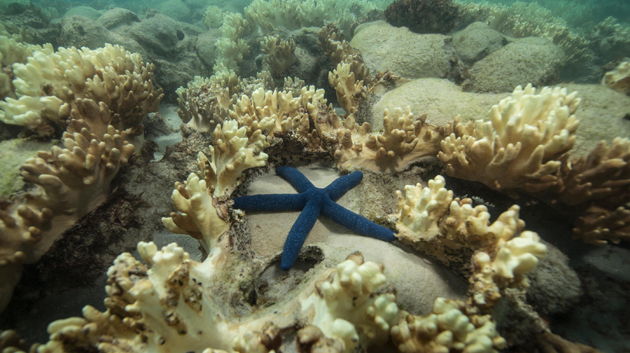

Scientists say good bacteria could be the key to keeping coral healthy, able to withstand the impacts of global warming and to secure the long-term survival of reefs worldwide.
“Healthy corals interact with complex communities of beneficial microbes or ‘good bacteria’,” says Tracy Ainsworth from the ARC Centre of Excellence for Coral Reef Studies at James Cook University who led the study. “It is very likely that these microorganisms play a pivotal role in the capacity of coral to recover from bouts of bleaching caused by rising temperatures.”
“Facilitating coral survival and promoting coral recovery are growing areas of research for coral reef scientists,” says co-author Ruth Gates director of the Hawaiʻi Institute of Marine Biology, University of Hawaiʻi at Mānoa. “To do this we need to explore and understand the bacteria that help keep corals and coral reefs healthy.”
Good bacteria promote resilient coral
Ainsworth and Gates have identified new directions for research in understanding coral survival in rapidly changing reef environments.
“We know that lasting changes to the community of beneficial bacteria affects important aspects of the function of host organisms such as humans or corals, including their ability to withstand further stress,” says Ainsworth.
“Corals rely on good bacteria but crucially we don’t yet understand these microbes well enough to know how they influence coral survival.”
Their latest research has been published in the journal Science, and gives an overview of the current understanding of bacterial communities on corals. It highlights the vital importance of good bacteria to coral health.
The scientists discuss how corals, and coral reefs that survive large-scale changes in the environment over the coming decades, are likely to be very different from those of today.
They say the interaction between corals and good bacteria is crucial to long-term survival.
Their work comes from recent advances in understanding the complexity of the coral’s genetic make-up and the unique bacterial communities that corals maintain.

Management efforts support coral reef sustainability
“Preventing physical contact with corals and maintaining high water quality on reefs during stress events will reduce stress loads on corals and creates the best case scenario for survival and recovery,” says Gates.
Ainsworth and Gates are currently participating in the 13th International Coral Reef Symposium being held in Honolulu, Hawaiʻi June 19–24. Gates is the president of the International Society for Reef Studies, the organizing body for the international meeting focused on coral reef science and management. The Symposium, held every four years, brings together nearly 2,500 coral reef scientists, policy makers and managers from 70 different nations in a forum to present the latest research findings, case histories and management activities, and to discuss the application of scientific knowledge to achieving coral reef sustainability.
More on the International Coral Reef Symposium
UH News story: Coral reef experts bridge science to public policy, June 22, 2016.
—By Marcie Grabowski

